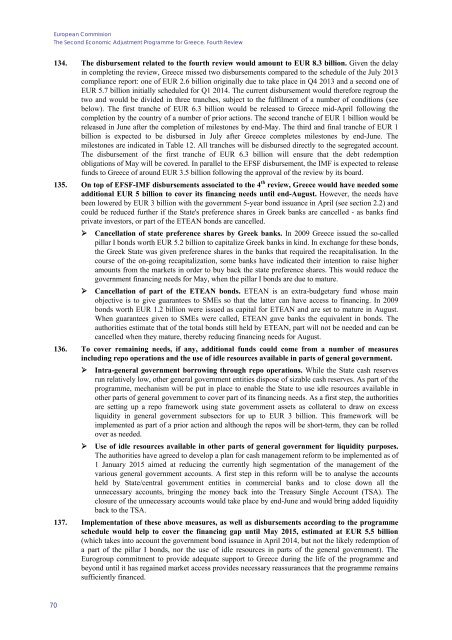ocp192_en
ocp192_en
ocp192_en
You also want an ePaper? Increase the reach of your titles
YUMPU automatically turns print PDFs into web optimized ePapers that Google loves.
European CommissionThe Second Economic Adjustm<strong>en</strong>t Programme for Greece. Fourth Review134. The disbursem<strong>en</strong>t related to the fourth review would amount to EUR 8.3 billion. Giv<strong>en</strong> the delayin completing the review, Greece missed two disbursem<strong>en</strong>ts compared to the schedule of the July 2013compliance report: one of EUR 2.6 billion originally due to take place in Q4 2013 and a second one ofEUR 5.7 billion initially scheduled for Q1 2014. The curr<strong>en</strong>t disbursem<strong>en</strong>t would therefore regroup thetwo and would be divided in three tranches, subject to the fulfilm<strong>en</strong>t of a number of conditions (seebelow). The first tranche of EUR 6.3 billion would be released to Greece mid-April following thecompletion by the country of a number of prior actions. The second tranche of EUR 1 billion would bereleased in June after the completion of milestones by <strong>en</strong>d-May. The third and final tranche of EUR 1billion is expected to be disbursed in July after Greece completes milestones by <strong>en</strong>d-June. Themilestones are indicated in Table 12. All tranches will be disbursed directly to the segregated account.The disbursem<strong>en</strong>t of the first tranche of EUR 6.3 billion will <strong>en</strong>sure that the debt redemptionobligations of May will be covered. In parallel to the EFSF disbursem<strong>en</strong>t, the IMF is expected to releasefunds to Greece of around EUR 3.5 billion following the approval of the review by its board.135. On top of EFSF-IMF disbursem<strong>en</strong>ts associated to the 4 th review, Greece would have needed someadditional EUR 5 billion to cover its financing needs until <strong>en</strong>d-August. However, the needs havebe<strong>en</strong> lowered by EUR 3 billion with the governm<strong>en</strong>t 5-year bond issuance in April (see section 2.2) andcould be reduced further if the State's prefer<strong>en</strong>ce shares in Greek banks are cancelled - as banks findprivate investors, or part of the ETEAN bonds are cancelled.‣ Cancellation of state prefer<strong>en</strong>ce shares by Greek banks. In 2009 Greece issued the so-calledpillar I bonds worth EUR 5.2 billion to capitalize Greek banks in kind. In exchange for these bonds,the Greek State was giv<strong>en</strong> prefer<strong>en</strong>ce shares in the banks that required the recapitalisation. In thecourse of the on-going recapitalization, some banks have indicated their int<strong>en</strong>tion to raise higheramounts from the markets in order to buy back the state prefer<strong>en</strong>ce shares. This would reduce thegovernm<strong>en</strong>t financing needs for May, wh<strong>en</strong> the pillar I bonds are due to mature.‣ Cancellation of part of the ETEAN bonds. ETEAN is an extra-budgetary fund whose mainobjective is to give guarantees to SMEs so that the latter can have access to financing. In 2009bonds worth EUR 1.2 billion were issued as capital for ETEAN and are set to mature in August.Wh<strong>en</strong> guarantees giv<strong>en</strong> to SMEs were called, ETEAN gave banks the equival<strong>en</strong>t in bonds. Theauthorities estimate that of the total bonds still held by ETEAN, part will not be needed and can becancelled wh<strong>en</strong> they mature, thereby reducing financing needs for August.136. To cover remaining needs, if any, additional funds could come from a number of measuresincluding repo operations and the use of idle resources available in parts of g<strong>en</strong>eral governm<strong>en</strong>t.‣ Intra-g<strong>en</strong>eral governm<strong>en</strong>t borrowing through repo operations. While the State cash reservesrun relatively low, other g<strong>en</strong>eral governm<strong>en</strong>t <strong>en</strong>tities dispose of sizable cash reserves. As part of theprogramme, mechanism will be put in place to <strong>en</strong>able the State to use idle resources available inother parts of g<strong>en</strong>eral governm<strong>en</strong>t to cover part of its financing needs. As a first step, the authoritiesare setting up a repo framework using state governm<strong>en</strong>t assets as collateral to draw on excessliquidity in g<strong>en</strong>eral governm<strong>en</strong>t subsectors for up to EUR 3 billion. This framework will beimplem<strong>en</strong>ted as part of a prior action and although the repos will be short-term, they can be rolledover as needed.‣ Use of idle resources available in other parts of g<strong>en</strong>eral governm<strong>en</strong>t for liquidity purposes.The authorities have agreed to develop a plan for cash managem<strong>en</strong>t reform to be implem<strong>en</strong>ted as of1 January 2015 aimed at reducing the curr<strong>en</strong>tly high segm<strong>en</strong>tation of the managem<strong>en</strong>t of thevarious g<strong>en</strong>eral governm<strong>en</strong>t accounts. A first step in this reform will be to analyse the accountsheld by State/c<strong>en</strong>tral governm<strong>en</strong>t <strong>en</strong>tities in commercial banks and to close down all theunnecessary accounts, bringing the money back into the Treasury Single Account (TSA). Theclosure of the unnecessary accounts would take place by <strong>en</strong>d-June and would bring added liquidityback to the TSA.137. Implem<strong>en</strong>tation of these above measures, as well as disbursem<strong>en</strong>ts according to the programmeschedule would help to cover the financing gap until May 2015, estimated at EUR 5.5 billion(which takes into account the governm<strong>en</strong>t bond issuance in April 2014, but not the likely redemption ofa part of the pillar I bonds, nor the use of idle resources in parts of the g<strong>en</strong>eral governm<strong>en</strong>t). TheEurogroup commitm<strong>en</strong>t to provide adequate support to Greece during the life of the programme andbeyond until it has regained market access provides necessary reassurances that the programme remainssuffici<strong>en</strong>tly financed.70


